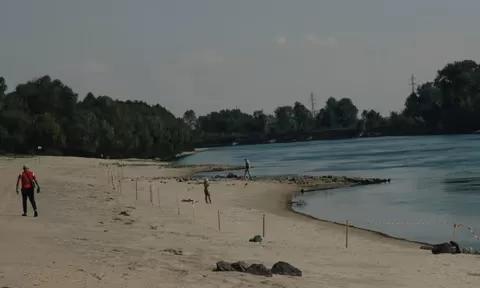Introduction: Desna River Pollution
The Desna River in Ukraine, a vital waterway supporting local ecosystems and communities, has become the tragic focal point of a devastating environmental crisis. Recent events have revealed that Russian forces are suspected of deliberately poisoning this river, prompting widespread condemnation and urgent calls for action.

The Start of the Crisis
On August 17, 2024, a toxic spill from the Russian border village of Tyotkino was detected in the Seym River, which feeds into the Desna. This incident involved the dumping of harmful chemical waste, including ammonia and nitrates, believed to be sourced from a nearby sugar factory. Local Ukrainian officials and scientists have confirmed that this deliberate act has led to a catastrophic die-off of aquatic life, causing significant concern for both the environment and public health.
Witness Accounts of the Disaster
In Slabyn, a small village in the Chernihiv region, Serhiy Kraskov, the village mayor, walked along the banks of the Desna to witness the unfolding tragedy. “Everything is dead, starting from the tiniest minnow to the biggest catfish,” he lamented as he observed the lifeless bodies of fish littering the banks. This scene was not just a local issue; it marked a significant environmental disaster with consequences for surrounding communities and ecosystems.
The Scale of Environmental Damage
According to Serhiy Zhuk, head of Chernihiv’s ecology inspectorate, over 650 kilometers of the Seym and Desna rivers have been severely affected, rendering the river ecologically dead. He stated, “Not a single organism survived. This is unprecedented. It’s Europe’s first completely dead river.” The ramifications extend beyond just the immediate impact on aquatic life; the health of local residents who rely on the river for drinking water, irrigation, and recreation is at serious risk.
The Impact on Wildlife
The spill’s effects have been devastating for local wildlife. Fish species, mollusks, and crustaceans have perished as oxygen levels in the water plummeted, with readings dropping to zero in affected areas. This stark reality underscores the urgent need for environmental intervention and recovery efforts.
Official Response and Cleanup Efforts
In the wake of this disaster, local and national authorities have implemented immediate measures to protect public health and address the environmental crisis. Prohibitions on swimming, fishing, and using river water for gardening have been put in place. Volunteers and emergency teams have mobilized to clean up the river, collecting dead fish and working to restore the ecosystem.
Efforts to pump oxygen into the Desna River and disperse some of the toxins have been initiated, but experts warn that the recovery process will be long and complicated. Zhuk emphasizes that restoring the river’s health will take years, and the ongoing conflict exacerbates the challenges ahead.
Broader Implications of Ecocide
The poisoning of the Desna River is not just an isolated incident but part of a broader pattern of ecological destruction resulting from the war. Svitlana Hrynchuk, Ukraine’s minister for environmental protection, highlighted that this crisis is symptomatic of a larger strategy to undermine Ukraine’s natural resources. She remarked, “Ukraine is fighting for its future. That future has to include nature.”
The ecological ramifications extend beyond immediate environmental damage; they pose long-term threats to water security, biodiversity, and public health. The act of ecocide against the Desna River signifies a new low in warfare tactics and raises urgent questions about the need for international action to protect vulnerable ecosystems.
The Cultural Significance of the Desna River
The Desna River holds immense cultural significance for Ukrainians. It has inspired literature, art, and folklore throughout history. The river symbolizes the connection between the people and their natural environment, making its degradation all the more poignant.
A Call for Global Awareness and Action
As the situation unfolds, it is critical for the global community to recognize the implications of such environmental crimes. Addressing the ecological impacts of warfare is essential for ensuring sustainable futures for affected regions. There must be a concerted effort to hold accountable those responsible for deliberate ecological harm and to support recovery efforts in the aftermath of such crises.
The Path Forward
The urgent need for a coordinated response to the ecological devastation in Ukraine cannot be overstated. The health of the Desna River and its surrounding ecosystems is not only vital for local communities but also serves as a reminder of the interconnectedness of nature and humanity. As Ukraine continues to navigate the complexities of war, the preservation of its natural resources must be prioritized.
In conclusion, the poisoning of the Desna River exemplifies the devastating impact of war on the environment. It is a clarion call for action to protect not just the river, but the broader ecological and cultural heritage of Ukraine. The fight against ecocide must be integral to the broader struggle for peace and justice in the
For Regular News and Updates Follow – Sentinel eGazette
FAQs
1. What caused the poisoning of the Desna River?
The poisoning is suspected to be caused by deliberate chemical waste dumping from a Russian sugar factory into the Seym River, which flows into the Desna.
2. How has the local wildlife been affected by the river’s pollution?
Local wildlife has suffered catastrophic die-offs, with fish species, mollusks, and crustaceans found lifeless due to oxygen depletion in the water.
3. What steps are being taken to clean the Desna River?
Local authorities and volunteers are conducting cleanup efforts, including collecting dead fish and pumping oxygen into the river to aid remaining aquatic life.
4. How does this incident impact the local communities?
The pollution poses health risks for communities relying on the river for drinking water, irrigation, and recreation, leading to strict prohibitions on using river water.
5. What is ecocide, and how does it relate to the Desna River crisis?
Ecocide refers to the deliberate destruction of the environment, and the poisoning of the Desna River is being characterized as an act of ecocide in the ongoing war.